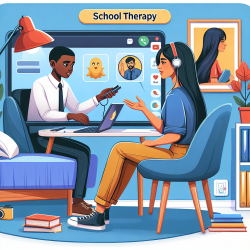Introduction
The COVID-19 pandemic has brought to light many societal issues, including the rise of anti-Asian attitudes. As practitioners dedicated to creating positive outcomes for children, it is crucial to understand the factors contributing to these attitudes and how we can mitigate them. A recent study titled "Anti-Asian Attitudes in the Context of the COVID-19 Pandemic: an Exploratory Study" provides valuable insights that can help us improve our practice and foster a more inclusive environment.
Understanding the Study
The study aimed to measure if individuals with greater "structural literacy"—awareness of racial and socioeconomic disparities in COVID-19 impact—held fewer negative attitudes against those perceived to be Asian. The survey was administered to 233 Black, Latinx, and White midlife adults from urban, suburban, and rural New York neighborhoods. The results indicated that greater awareness of disparities in COVID-19 was associated with lower levels of anti-Asian attitudes.
Key Findings
- Greater structural literacy was linked to fewer anti-Asian attitudes.
- Participants experiencing higher socioeconomic disadvantage and those living in rural areas held more anti-Asian attitudes.
- Psychological distress was not significantly associated with greater anti-Asian attitudes.
Implications for Practitioners
As speech-language pathologists, we can leverage these findings to improve our practice and support the children we serve. Here are some actionable steps:
1. Increase Structural Literacy
Incorporate education on socioeconomic and racial disparities into your practice. This can be done through workshops, training sessions, and resource materials that highlight the structural factors affecting health outcomes.
2. Foster Inclusive Environments
Create a welcoming and inclusive environment for all children. Encourage open discussions about race and socioeconomic disparities, and provide support for children who may be experiencing discrimination.
3. Advocate for Policy Changes
Advocate for policies that address structural inequalities. This can include pushing for better funding for schools in disadvantaged areas and supporting legislation that aims to reduce health disparities.
Encouraging Further Research
While this study provides valuable insights, more research is needed to fully understand the impact of structural literacy on anti-Asian attitudes and other forms of discrimination. Encourage your colleagues and peers to engage in research and contribute to the growing body of knowledge on this topic.
Conclusion
By increasing our awareness of structural disparities and fostering inclusive environments, we can help reduce anti-Asian attitudes and create better outcomes for the children we serve. Let's work together to build a more equitable and just society.
To read the original research paper, please follow this link: Anti-Asian Attitudes in the Context of the COVID-19 Pandemic: an Exploratory Study










